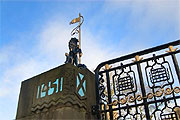Source: University of Glasgow
Notable People
Guido Pontecorvo
-
Guido Pontecorvo

-
Guido Pontecorvo at the Albert Einstein College of Medicine, Autumn 1964

Source: University of Glasgow
-
Guido Pontecorvo delivering the Jesup Lecture at Columbia, April 1956

Source: University of Glasgow
-
Guido Pontecorvo opening the Pontecorvo Building, 1995

Source: University of Glasgow
-
Guido Pontecorvo receiving the EC Hansen prize and medal, November 1961

Source: University of Glasgow
-
Guido Pontecorvo with Frank Ruddle and Francis Crick, June 1978

Source: University of Glasgow
-
Guido Pontecorvo, Seymour Melman, Ruth Sanger and Jim Watson, August 1953

Source: University of Glasgow
Geneticist
Born 29 November 1907.
Died 25 September 1999.
A ground breaking geneticist who established the fungus Aspergillus nidulans as a conventient genetical tool and who discovered and patented the 'Parasexual cycle'.
Connection to the University of Glasgow: Honorary Graduate, Lecturer, Professor
GU Degree: LLD, 1978;
Discover more geneticists on the University of Glasgow Story website
Achievements
The following achievements are associated with Guido Pontecorvo:
Discovery of the ‘Parasexual cycle’
Guido Pontecorvo and Alan Roper discovered the 'Parasexual cycle' that causes genetic re-assortment without sexual reproduction.
Establishing the fungus Aspergillus nidulans as a convenient genetical tool
Guido Pontecorvo undertook pioneering work in genetics by establishing the fungus Aspergillus nidulans as a convenient genetical tool, which is now used throughout the world.
First patent to be issued in any jurisdiction for a natural biological process
Guido Pontecorvo and Alan Roper patented their discovery of the 'Parasexual cycle'.
Honours
The following honours are associated with this person:
Biography
Guido Pontecorvo (1907-1999), who liked to be known by his nickname, Ponte, was the University's first Professor of Genetics, 1955 to 1968, and has been described as "one of the founding fathers of modern genetics". He endowed prizes and scholarships for students at the University and the Genetics Building was named for him in 1995.
Born and educated in Pisa, Pontecorvo was forced to leave Italy in 1938 and settled in Scotland. He was appointed a lecturer in Genetics at the University's Zoology Department in 1945, and a new department was set up in the Anatomy laboratories of the Anderson College building soon afterwards. He became a Reader in 1952, three years before his appointment to the new Chair. He left Glasgow in 1968 to take a post at the Imperial Cancer Research Fund's laboratories in London.
Pontecorvo was one of the leading figures of his day in the study of cell genetics. He was the founder of the genetics of Aspergillus nidulans, a relative of Penicillium, and originated genetical studies in many other fungi. He elucidated the divisibility of the gene by recombination, and after leaving Glasgow he carried out important research in the application of parasexual techniques to mammalian cell cultures.
For more information relating to the papers of Guido Pontecorvo, please visit The Wellcome Digital Library site Codebreakers: Makers of Modern Genetics.

